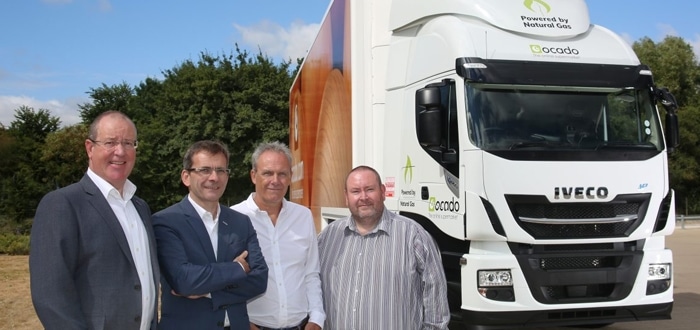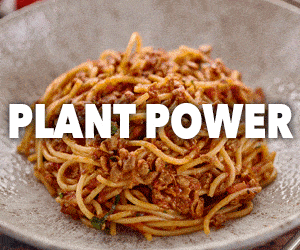Online supermarket Ocado is set to take on 29 new IVECO Stralis NP tractor units marking the largest order for single-fuel gas-powered trucks of any manufacturer to-date in the UK – with the refuelling infrastructure provided by Gasrec.
Supplied by Guest Truck and Van, five of the compressed natural gas (CNG) vehicles (AS44S40T/P NP) will enter service immediately, operating out of the company’s Dordon CFC (customer fulfilment centre) near Tamworth.
The remaining 24 trucks will go into operation later in the year when Ocado’s dedicated natural gas refuelling facility is opened by Gasrec at its Hatfield CFC, in a move that boosts the green credentials of its 147-strong fleet of heavy vehicles.
Stuart Skingsley of Ocado, says: “We were immediately attracted to the Stralis NP when it was launched as it appeared to be the step change in technology that would drive gas powered trucks to a new place in the market. The demonstrator vehicle received positive feedback from our drivers, and our own experience driving the vehicle was also positive.
“The green credentials of this vehicle are clear, and once we had reviewed the fuel costs against our existing diesel fleet it was clear there was also a cost benefit to running these cleaner, quieter vehicles.”
Ocado has opted for a full repair and maintenance package with Guest Truck and Van throughout the five-year lease period, which will see all servicing work take place within the IVECO network.
Pierre Lahutte, IVECO Brand President, says: “Ocado has earned a reputation as an environmentally responsible company and they recognise the expertise IVECO has as the leading technology developer in the natural gas-powered commercial vehicle sector.
“This order could mark a significant turning point for the take-up of natural gas heavy trucks in the UK and is yet more evidence we offer a viable replacement for diesel vehicles right now.”
James Westcott, Chief Commercial Officer of Gasrec, comments: “Seeing the first CNG-powered trucks entering the Ocado fleet represents a turning point for the industry, as businesses begin the transition from diesel to a cleaner, quieter and cheaper fuel. The new refuelling station we are building for Ocado is testament to our commitment to helping environmentally conscious companies move to natural gas, through both open-access refuelling stations and the construction of dedicated facilities for larger fleets.”
The Stralis NP is powered by a Cursor 9 Euro VI natural gas engine which doesn’t require any diesel or petrol-derived fuel, and benefits from a maintenance-free and AdBlue-free after-treatment system. It delivers the same output of 400 hp and 1,700 Nm torque as its diesel equivalent, resulting in an excellent power-to-weight ratio, power density and quietness of operation – perfect for Ocado’s operation, where artics typically operate at gross vehicle weights up to 38 tonnes.
Each vehicle emits 50 per cent less NOx emissions, 95 per cent less particulate matter versus Euro VI limits, and 95 per cent less CO2 when using compressed biomethane. They are fitted with eight gas tanks, offering an expected range of up to 600km. This fuel also offers the opportunity for Ocado to reduce its running costs thanks to natural gas being around 30 per cent cheaper than diesel.
IVECO was the first commercial vehicle manufacturer to look at the potential of natural gas in 1991 – an anticipation that allowed the company to develop a full range of natural gas trucks, vans and buses. Currently, more than 25,000 IVECO gas-powered vehicles have been delivered into service.
Today, the Stralis NP range of heavy trucks have become the first gas-fuelled trucks ever to combine the power, range and driving comfort offered by their diesel-powered equivalents, presenting fleets with the opportunity to make their transport operations even more sustainable.
Ocado is the world’s largest dedicated online grocery retailer with more than 580,000 active customers globally. The company is working to become the UK’s most environmentally-friendly supermarket and in 2017 continued a five-year trend of improving its energy efficiency, resulting in a 27 per cent improvement since 2012.











